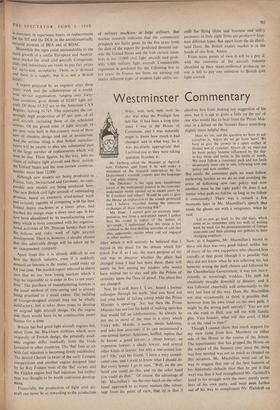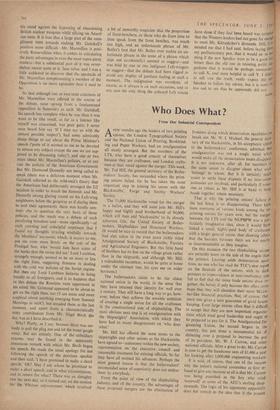Westminster Commentary
WELL, well, well, well, well. So this was what the Prodigal Son felt like It had been a long time since I was at the House of Commons, and I was naturally eager to know how much it had changed and in .what way. So it was peculiarly appropriate that I arrived just as they were taking question Number 6:
Mr. Driberg asked the Minister of Agricul- ture, Fisheries and Food if he will make a statement on the research undertaken by his Department's scientific experts into the language . of cod while mating
Ma. DRIIIERG : Is the right hon. Gentleman aware of the widespread interest in the romantic underwater world opened up in recant years by' M. Cousteau and others? Would he care to give the House an impression of the sounds produced and, I believe, recorded during the amorous exchanges,of these interesting fish?
Mit. HARE: I cannot give an accurate inter- pretation, hut from a newspaper report I gather that. the sound is rather of the nature of 'grr-umph.' I understand that this noise is not confined to the love-making activities of cod: but also, apparently. occurs when cod are engaged in other matters.
After* which it will scarcely be believed that I stayed in my place for the debate which fol- lowed. For if, as I say, the main purpose of my visit was to discover whether the place had changed since I had last been there, there will surely be few among my readers who would have wished me to stay and pile the. Pelion of certainty upon the Ossa. of-proof. The place -has not changed.
Nor, be it said, have I. see,' hissed a former colleague through his teeth, 'that you have not lost your habit of falling asleep while the Prime Minister is speaking.' No; but then the Prime Minister has not lost his habit of making speeches that would fell an ichthyosaurus. As always, he put me in mind of the man in a story which Vicky tells. Moishe, it seems, meets Schloime, and asks him anxiously if he can recommend a one-armed lawyer. Schloime, baffled, replies that he knows a good lawyer, a cheap lawyer, an expensive lawyer, a shady lawyer, and several other kinds of lawyer; but why a one-armed law- yer? `Qh,' says his friend, 'I have a very compli- cated-case, and I want to know what I should do. But "every lawyer I go to says, "Well, on the one hand you could do this, and on the other hand you could do that." ' Of course, the advantage of Mr. Macmillan's 'on-the-one-hand-on-the-other- hand' approach to so many matters (the advan- tage from his point of view, that is) is that it absolves him from making any suggestion of his own, but it is apt to grate a little on the car of one who would like to hear from the Prime 'Min- ister in a debate on the Summit fiasco something slightly more helpful than Here we arc, and the question we have to ask ourselves is. where do we go from here? We have to give the answer in a spirit neither of despair nor of cynicism. Above all, we must not let basic policy become •influenced by the' day- to-day turns and twists in the battle of words. We must follow a consistent path and not lurch desperately from side to side. following now one
- policy and now-another.
But surely the ,consistent path we must follow, eschewing lurches as we do so and avoiding the error of following now one policy, and now another, must be the right path? Or.does it not matterwhat path we follow, so long as we follow it consistently? There was a remark a few moments later in Mr. Macmillan's speech that made the ghosts stir with a vengeance, when he said Let us not go back to the old days, which some of.us remember only too well, of waiting week by week for the pronouncements of foreign statesmen and then attuning our policies to their changing emphasis.
Now, as it happens, -Mr Macmillan's record in those old days was very good indeed, unlike that of many of his own supporters who cheered him roundly at that point (though it is possible that they did not know what he was referring to); but however wrong the path chosen and followed by the Chamberlain Government, it was not incon- sistently or waveringly trodden. The path led absolutely straight downhill to disaster, and Was followed cheerfully and unhesitantly to the very last foot of the way. Does. Mr. Macmillan not stop occasionally to think it possible that however firm his own tread on his own path, it might be the wrong path entirely? 'You are not on the road to Hell, you tell me with fanatic glee. Vain boaster, what will that avail, if Hell is on the road to thee?'
Though I cannot claim that much support for my view came from hon. Members on either side of the House in the course of the debate. The bipartisanity that 'has gripped the House on the subject of the Summit ever since the thing was first mooted was not so much as chipped on this occasion. Mr. Macmillan went out of his way to suggest that one -of the -best features of his diplomatic debacle (not that he put it that way) was that it had strengthened Mr. Gaitskell's hand in his struggle with the more unruly mem- bers of his own party, ancl weutt even farther out'of his way to compliment Mr Gaitskill on his stand against the hypocrisy of abandoning British nuclear weapons while relying on Ameri- can ones. It is true that a large part of the com- pliment went towards making Mr. Gaitskell's position more difficult – Mr. Macmillan is posi- tively Rooseveltian when it comes to calculating the party advantages in even the most supra-party matters—but a substantial part of it was never- theless meant quite at it. face value, and I was a little saddened to discover that the spectacle of Mr. Macmillan complimenting a member of the Opposition is no more agreeable than it used to be.
So that although one or two mild criticisms of Mr. Macmillan were offered in the course of the debate, none sprang from a fundamental opposition to Summitry as such. Mr. Gaitskell, his speech less complete when he rose than it was wont to be (the result, as far as a listener like myself was concerned, was pure gain; I never once heard him say 'If I may say so with the utmost possible respect'), had some admirably sharp things to say about the Prime Minister's speech (`parts of it seemed to me to be devoted to almost any subject except the one we are sup- posed to be discussing today'), and one or two more about Mr. Macmillan's policies, or at any rate the policies of the American Government. But Mr. Desmond Donnelly not being called to speak (there was a delicious moment when Mr. Gaitskell referred to the wild-men's theory that the Americans had deliberately arranged the U2 incident in order to wreck the Summit, and Mr. Donnelly swung glaring round on his Left-wing neighbours below the gangway as if daring them to nod their agreement), there was hardly any- body else to question the very basis of those policies, and the result was a debate of such paralysing boredom and—more significantly—Of such yawning and unhelpful emptiness that I found my thoughts straying wistfully towards the Members' tea-room; which, it occurs to me, put me even more firmly on the role of the Prodigal Son, who 'would fain have eaten of the husks that the swine did eat.' Lord Lambton, strangely enough, seemed to be on more or less the right lines, suggesting firmness in dealing with the cold war policies of the Soviet regime. But then my Lord Lambton believes in being beastly to all foreigners, and it so happens that in this debate the Russians were uppermost in his mind. Mr. Grimond appeared to be about to get on the right lines, too ('1 am more and more sceptical about anything emerging from Summit Meetings as such'), but avoided them at the last moment, and apart from a characteristically witty contribution from Mr. Nigel Birch the day was as I have described it.
Why? Partly, as 1 say, because there was no- body to pull the plug out and let the water gurgle away. But not entirely. One of the subsidiary reasons may be found in the apparently innocuous remark with which Mr. Birch began his speech. He made the usual apology for not following the speech of the previous speaker and then said, '1 have promised to make a short speech.' Oh? May I ask whom he promised to make a short speech, and in what circumstances, and in return for what? There was an almighty row the next day, as it turned out, on the motion for the Whitsun adjournment, which involved a lot of unworthy suspicion that the proportion of front-benchers, or those who do from time to time speak from the front benches, was much too high, and an unfortunate phrase of Mr. Butler's (not that Mr. Butler ever makes an un- fortunate phrase in the sense of a phrase which slips out accidentally) seemed to suggest—and was held by one or two indignant Left-wingers to suggest—that the debate had been rigged to avoid any display of partisan feeling at such a moment. The indignation was overdone, of course, as it always is on such occasions, and in any case the only thing the unheard Left would have done if they had been heard was compl that the Western leaders had not „gone far eno to meet Mr. Khrushchev's demands. Still, it minded me that I had said, before laying do my parliamentary pen, that it would 'oe thing if the new Speaker were to be a good (10 lir'mer than the old one in resisting polite sal' gestions that it would be perhaps unnecessan to call X. and most helpful to call Y. 1 dg.fill to tell you the truth, really expect the ne° Speaker to follow my advice, but it is none the less sad to see that he apparently did not rill



































 Previous page
Previous page